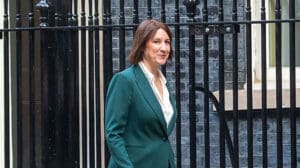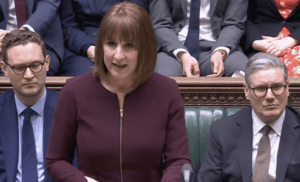Government borrowing came in well below expectations in July, offering some short-term relief to chancellor Rachel Reeves as she prepares her autumn budget.
Public sector net borrowing totalled £1.1 billion last month, the Office for National Statistics (ONS) said – less than half the £2.6 billion forecast by economists and below the Office for Budget Responsibility’s (OBR) £2.1 billion projection.
The undershoot was driven by stronger self-assessment receipts and lower debt costs. July is a key month for income tax revenues, and self-assessment payments climbed to £15.5 billion, up £2.7 billion year-on-year. At the same time, debt interest payments stood at £7 billion, £1.5 billion lower than OBR estimates.
Overall, tax receipts rose by £6.1 billion to £77.6 billion, led by income tax and national insurance contributions. Public spending reached £92.1 billion, up £5.3 billion from a year earlier, with state pensions and day-to-day departmental costs continuing to rise alongside inflation.
So far this fiscal year, borrowing has reached £60 billion, broadly in line with the OBR’s forecast of £59.9 billion. However, the underlying budget deficit – a key fiscal rule measure – is running £5.7 billion above projections, intensifying the challenge for Reeves as she looks to balance revenues with spending.
Economists remain divided on the size of the gap. Capital Economics suggests the chancellor may need to plug a shortfall of up to £27 billion after Labour reversed welfare and winter fuel cuts, while the National Institute for Economic and Social Research (NIESR) places the figure closer to £40 billion.
The OBR’s updated projections at the autumn budget will be critical. Analysts expect it to cut long-run productivity estimates and trim assumptions for interest rate reductions, both of which would weigh on the public finances.
Still, July’s data suggests borrowing is broadly tracking expectations. Martin Beck, chief economist at WPI Strategy, said: “A deficit of 4% of GDP isn’t a fiscal crisis, but it is uncomfortably high for an economy close to full employment. Borrowing in line with the OBR’s forecast is one reason to think that talk of a huge black hole in the public finances is overstated.”
Darren Jones, chief secretary to the Treasury, said the government remained focused on bringing borrowing down: “Far too much taxpayer money is spent on interest payments for the longstanding national debt. That’s why we’re driving down borrowing across this parliament so working people don’t have to foot the bill.”
Markets now expect the Bank of England to hold interest rates at 4 per cent for the rest of the year, which could push annual debt servicing costs higher from their current level of around £100 billion.


















